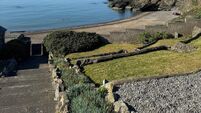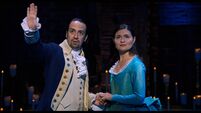Royal visit - New chapter for our relations
It was a deeply psychological and symbolic moment, an acknowledgment by the British head of state that she was in Ireland as a visitor, a guest of the Irish head of state, President Mary McAleese.
The true significance of the event sank home as the strains of God Save the Queen and Amhrán na bhFiann rang out across the broad acres of the Phoenix Park, climaxing in a 21-gun salute, a volley of shots fired not in anger but in friendship and welcome. There was no bowing and scraping. Neither was there any sense of superiority or of subservience. It was a meeting of equals, a coming together of the representatives of two neighbouring nations in mutual respect, a moment of which the people of Ireland can rightly be proud.
Illustrating the profound change in relationships, the queen is the first British monarch to visit the Republic. A century ago, when the last reigning monarch, King George V, came here, what is now a sovereign state was then part of the United Kingdom.
In a busy day, the 85-year-old great-grandmother met people of the stature of social activist Sr Stan as well as leading writers, artists and entertainers. In stark contrast, misguided diehards were plotting mayhem in the shadows and hardline protesters in balaclavas launched an assault on gardaí on the streets of Dublin.
Unfortunately, because of security precautions the streets of Dublin were virtually empty. However, as seen on O’Connell Street, the vast majority of the Irish people welcome the queen and approve her visit.
In a welcome sign of progress and maturity, decent law-abiding citizens no longer get hot under the collar at provocative talk about the “800 years of British oppression”. With the peace process in the North now complete, people are getting on with their lives, struggling to survive in times of hardship.
However, negating the true meaning of republicanism, and when the country can ill-afford it, violent factions opposed to the four-day royal visit will cost the Exchequer an estimated €30 million in the biggest security exercise in the history of the state. Reflecting their cowardly tactics, a viable pipe bomb was found on a bus at Maynooth.
In the face of such threats, Queen Elizabeth set a remarkable example by her dignified presence. Characteristically, in the ceremony at the Garden of Remembrance, where nearby protesters could be heard, she quietly underlined the ethos of reconciliation enshrined in her visit by honouring the memory of Irish men and women who died fighting against the might of the British Empire.
During tonight’s address at Dublin Castle if she fails to give an apology for the past, the very act of paying her respects to the dead at the Garden of Remembrance means she has already apologised in a powerful and meaningful way. Furthermore, her presence at Croke Park will also be taken as a gesture of deep regret for the revenge killing by British soldiers of 14 spectators and players at a football match in 1920, a memory etched in the history of the GAA.
Despite the naysayers, it would be hard to exaggerate the significance of the new chapter of Anglo-Irish relations opened by the queen’s visit. From a psychological viewpoint, it marks a fresh departure. Old enmities have long since been put aside. As neighbours, a new era of positive partnership and closer co-operation has begun.







